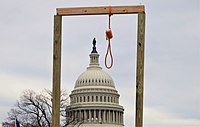
Photo from wikipedia
Sleep deprivation and sleep disturbance are pervasive among military personnel during and after combat deployment. However, occupational and other constraints often influence military workers to decline behavioral health services and… Click to show full abstract
Sleep deprivation and sleep disturbance are pervasive among military personnel during and after combat deployment. However, occupational and other constraints often influence military workers to decline behavioral health services and prescription pharmaceutical sleep aids. This article, drawing on ethnographic interviews with National Guard veterans of combat deployment, demonstrates that soldiers with sleep disturbance frequently manage symptoms without medical supervision and by using ad hoc methods including alcohol use. Findings suggest the potential significance of further research into the sleep management practices of military populations, who face both high risk for sleep disturbance and occupational and cultural constraints in effectively managing these serious health concerns.
Journal Title: Sleep health
Year Published: 2018
Link to full text (if available)
Share on Social Media: Sign Up to like & get
recommendations!